|
|
Service, Support & Advocacy | |
|
|
Do you have Billtrack50 yet?
A powerful tool to track State and Federal legislation, and it's free.
Just email us a request at info@nssba.org to get your link to enroll today!
| N-SSBA wants to thank our Strategic Partner Sponsor | |
N-SSBA WELCOMES
THE FOLLOWING DISTRICT
WHO HAS REJOINED OUR ASSOCIATION
| |
Welcome
aboard
to the
Hurricanes!
| |
Executive Director's Message
First off, we thank you all for your service to the students and communities you serve in your roles as members of your district's governance teams.
We also want to thank the over 780 individuals who registered for our webinar that featured Mr. David Frank and Dr. Jeff Matteson from the State Education Department to discuss their regionalization plan.
Approximately 430 people watched the 90 minute webinar live which had nearly 60 minutes of a question and answer segment. Since posting the webinar on our YouTube channel it's had over 1,000 views.
After the webinar was completed, we emailed the recording link and the PowerPoint presentation to all member and non-member district clerks and we also emailed it to the offices of every NYS Assemblymember and Senator.
We presented the webinar with the sole intent for the region to hear directly from the State Education Department officials and address the questions and concerns about this plan directly. How you personally feel about their answers is completely up to you, and how your governance team moves forward with this initiative is also up to you. That's what local control and governance is about.
You can access the recorded webinar here.
We want to let you know about some other activities we have spearheaded over the last several months. Over the summer, we requested and coordinated a meeting with Governor Hochul regarding a statewide policy on cell phones in the classroom. We stressed that this is something that should be left to a decision by local boards of education as policies can vary within a district by grade level and can vary from community to community.
We have also taken the lead in facilitating two separate legislator roundtable discussions with our State Assemblymembers and Senators. We discussed a variety of topics, including Foundation Aid, zero emission bus mandates, and the impact of charter schools on our region. We will be having a third roundtable in the coming weeks to review the recommendations of the Rockefeller Institute Study on Foundation Aid, and a further discussion on regionalization.
We look forward to your continued engagement as we address these important issues together.
We also want to encourage all of you to register and attend our annual joint conference that we co-host with the Nassau and Suffolk School Superintendents Associations (NCCSS / SCSSA). We will be discussing the issues of mental health for our students and we will be highlighting the community resources that are available to all of our districts across Long Island. Check with your district clerks about registration information.
Lastly, it was great seeing many of you at NYSSBA's annual convention in NYC. There were great workshops, Long Island was well represented, and so many of our districts were highlighted with student performances and training sessions. Well done and congratulations to all!
| | | |
Long Island Shines at
NYSSBA's Convention
| |
3 Superintendent's views on AI | |
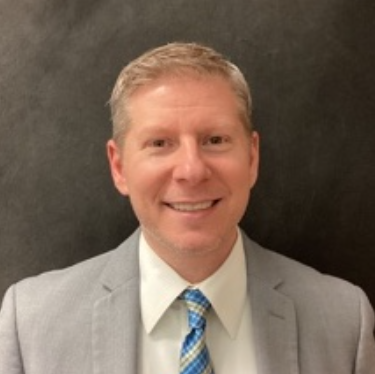 | |
Dr. Jarod T. Bloom
Franklin Square
Building a Foundation
for AI
Last year, we formed an AI collegial circle to explore how AI could enhance our districts. Unlike past approaches to innovation, we recognized the importance of educating staff and our communities about AI to ensure they understand its role and potential benefits, reassure them of our commitment to maintaining privacy and ease concerns over possible challenges. This article explores how AI is reshaping the future of learning and how superintendents play a critical role in guiding change within our schools.
Dr. Karim Lakhani, Professor of Business Administration at the Harvard Business School, stated, "AI Won’t Replace Humans – But Humans With AI Will Replace Humans Without AI." This perspective captures our approach to AI in our districts. We believe we must leverage AI as a tool for enhancing educational outcomes, personalizing learning, and preparing our students for their future—not the past.
The rapid advancement of AI technology is growing exponentially, and the time for action is now. While some districts are already using AI and others are in the process of implementation, it's important to recognize that this technology is not new. AI has been with us since the 1950s, starting with the Turing test, evolving through milestones such as the Eliza chatbot in the 1960s, Deep Blue's chess victory in the 1990s, and IBM Watson's win on Jeopardy in the 2000s. Today, AI tools including ChatGPT, Claude, Copilot, and Gemini, as well as home devices such as Alexa, Apple's iPhone, or Google Assistant, have become integral to the daily routines of many.
This brings us to an important question: what exactly is AI, and what isn’t it? It's easy to overestimate AI's capabilities, especially with the rapid advancements in reasoning models. While AI chatbots can seem convincingly human, it's crucial to understand their limitations. AI language models analyze vast amounts of text data, identify patterns, and generate human-like text by predicting the next word. However, they do not truly understand or think as humans do—they simply mimic human-like responses.
In Franklin Square UFSD, AI has given our teachers and administrators some of their nights and weekends back while helping them increase their productivity and provide more tailored instruction for our students. In a world where we are constantly connected, this is crucial.
Soon, our teachers will no longer have to manually sift through heaps of data to understand student progress and provide targeted materials. Instead, AI takes on that task, freeing up teachers to focus on connecting with students and guiding their growth. When used thoughtfully, AI gives us back the time to have those human interactions that make education even more impactful.
As an elementary school district, we are uniquely tasked with tailoring education to meet the needs of Long Island’s youngest learners. In Franklin Square, our students benefit from EdLaw2D-compliant AI tools designed to support and enhance learning in reading and math. We also utilize AI to teach prompting and provide support within a secure, district-monitored environment. Additionally, our teachers have access to various AI tools that enable them to differentiate, individualize, model, and support instruction to address the diverse needs of learners every day.
We have a moral obligation to prepare students for their future, not ours. By embracing AI, we can ensure that every student and educator is empowered to reach their full potential. If we fail to act, we risk widening the digital divide—leaving behind students who lack access to these tools while others move ahead. Together, we can create an adaptive, inclusive learning environment ready to face the challenges of tomorrow, making AI a positive force for all our students and communities.
| |
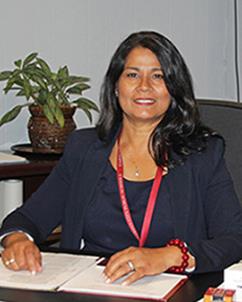 | |
Dr. Kusum Sinha
Garden City
Supporting Educators in the AI Journey
As artificial intelligence (AI) transforms education, it is essential that we embrace its potential while ensuring our educators are fully prepared to integrate these tools effectively. In Garden City, we’ve made a deliberate effort to provide professional development that makes AI both engaging and accessible. Our goal is to help teachers and administrators explore AI in a way that is manageable and enjoyable, allowing them to apply what they learn immediately to benefit their students.
We’ve introduced innovative programs such as “Pajama PD,” relaxed evening virtual professional development sessions where teachers explore AI tools in a supportive environment. Additionally, flexible learning opportunities such as “Tech Bytes”—quick sessions during lunch or before school—and “Pretzel Tuesdays,” after-school workshops with snacks and prizes, offer hands-on demonstrations of AI applications. These efforts empower our teachers to bring AI tools into their classrooms, fostering enthusiasm and confidence as they witness the positive effect on student learning.
As AI becomes a more essential part of education, school boards must engage in understanding its capabilities and implications. AI presents both opportunities and challenges, particularly concerning ethics and responsible use. It is essential that school boards, in collaboration with administrators, take a proactive role in shaping policies that guide the ethical implementation of AI while ensuring it upholds the integrity of education.
Updating district policies—including acceptable use policies and codes of conduct—is critical to ensuring that both teachers and students use AI responsibly and it is important that these updates are clearly communicated to staff. Including language to address data privacy as well as, ethical use and fairness, and they need to be clearly communicated to staff. Teachers should be aware of their responsibilities in using AI that they model ethical practices for students. Additionally, engaging stakeholders in the development of a vision statement for AI use encourages thoughtful discussion and engagement, to ensure that AI is used to enhance learning, not to replace critical thinking or undermine academic integrity.
We recognize the responsibility of superintendents to work with their school boards to remain actively involved in understanding how AI impacts education. By grasping its benefits, limitations, and ethical considerations, school boards can make informed decisions about the tools they adopt and the policies they implement. This engagement helps ensure AI is used to advance educational goals while protecting student privacy.
AI is proving to be a powerful tool for creating efficiencies in education. Teachers and administrators are benefitting from AI’s ability to automate routine tasks such as grading, lesson planning, and providing real-time insights into student progress. This frees up time for more meaningful activities like individualized student support and collaborative planning. However, it is essential to balance AI's efficiencies with human oversight. AI should complement, not replace, human judgment.
In Garden City, we have seen firsthand how AI can boost efficiency while maintaining integrity. We developed a chatbot to assist with teacher observation write-ups, which has saved time and allowed administrators to engage in more reflective conversations with staff. However, it is crucial that final evaluations still reflect personal insights, preserving the human element in the process. This balance—leveraging AI to streamline tasks while maintaining human oversight—is key to ensuring AI supports, rather than replaces, the personal touch in education.
| |
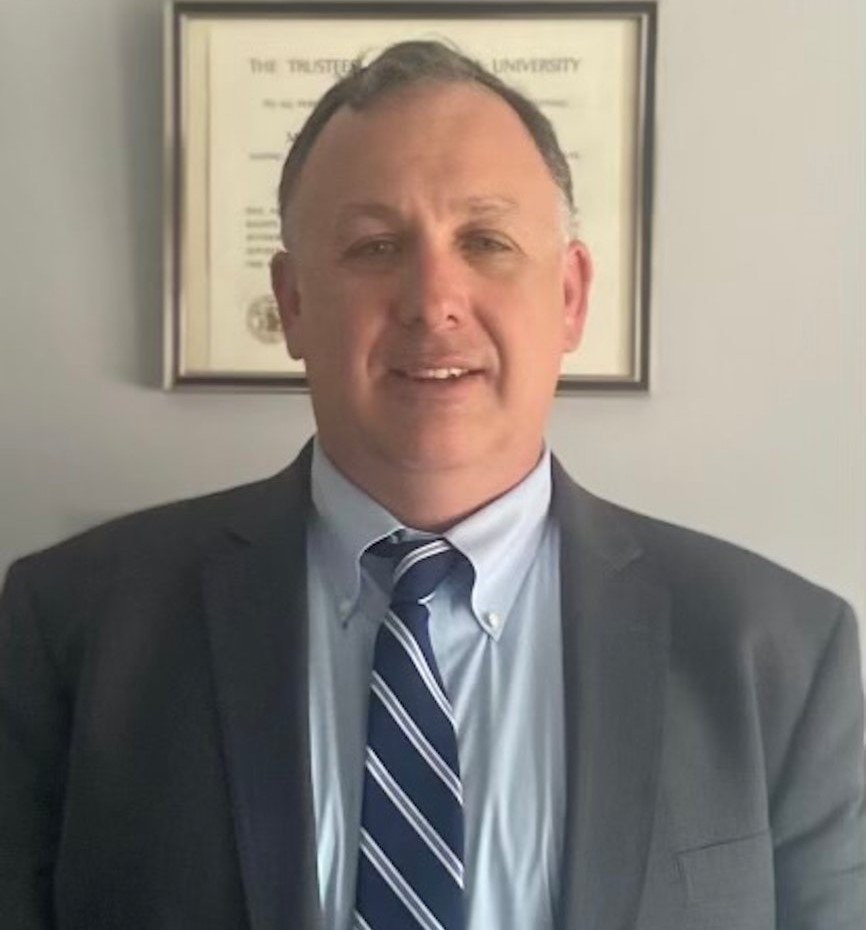 | |
Matthew Gaven
Rockville Centre
Equipping Students for an AI-Driven World
AI is already changing how we live and work, and our job is to ensure that students are ready to thrive in this new landscape. We already see the impact of AI algorithms in our everyday lives…from our social media feed to Siri and Alexa, to the personalized learning pathways in Khan Academy. AI is all around us.
In Rockville Centre, we believe in integrating AI into our instructional programs in ways that foster inquiry, creativity, and responsible use of technology. While AI can seem like magic, its true power lies in thoughtful implementation. AI isn’t just a tool; it’s a resource that can help our students engage more deeply with content, solve real-world problems, and collaborate with their peers.
We’ve built our approach to AI around three pillars: security, stewardship, and skepticism. First and foremost, we are committed to student data and ensuring privacy. Next, we focus on stewardship—teaching students to use AI responsibly, to enhance their learning without using the tool to replace thinking. Finally, skepticism plays an important role. AI can make mistakes, reflect biases, and provide inaccurate information, so our students must learn to question and verify AI-generated content. We teach students to ensure the accuracy of AI-generated content through investigation and authentication, cultivating critical thinking skills that extend beyond AI. This process enhances their media literacy, thereby enabling them to interpret information more effectively in all aspects of their daily lives. These three concepts have helped us implement AI in a way that allows our students and teachers to be more creative and productive.
We’re integrating AI in meaningful ways at every level in Rockville Centre. In our elementary schools, our approach to AI fosters curiosity and collaborative learning. Our students use AI-powered tools to improve their writing through AI guided feedback, interact and engage more deeply with characters from literature and use AI-powered chatbots to engage in role playing scenarios with figures from history. By interacting with AI-powered tools, young students learn to ask deeper questions, work with their peers to solve problems, and build early digital literacy skills that will set them up for success in later years.
At the middle school, we've introduced a new course, Research in the Age of AI, where students use AI as a research assistant to explore community-based solutions to real-world problems like ocean pollution. They present their findings and solutions to peers and teachers, fostering a collaborative learning environment. This approach emphasizes not just individual research but also the value of learning with and from peers, as students refine their ideas, gain diverse perspectives, and deepen their understanding through group interactions.
At our high school, students are learning prompt engineering, a critical skill for navigating the AI-driven world. Prompt engineering is used to determine the optimal input to generate the optimal output from the generative AI model. Our students are discovering that the way a question is framed directly impacts the quality of the response. They are also learning how to use prompt engineering to generate code and create their own AI bots to meet challenges identified by their fellow students. By mastering this skill, they’re developing not just technical expertise, but the critical thinking needed to solve complex challenges.
As AI continues to reshape industries and societies, our commitment is to equip our students with the skills and mindsets they need to be not just participants, but pioneers in this new era. By fostering inquiry, creativity, and responsible AI use, we are preparing the next generation of leaders to navigate and shape the future.
| |
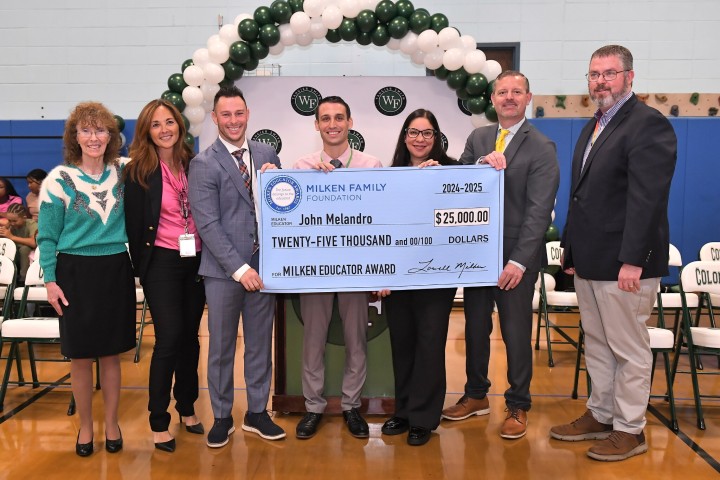 | |
William Floyd School District
Elementary Teacher John Melandro Surprised with Milken Educator Award
John Melandro received a heartwarming surprise at a schoolwide assembly when he was with a Milken Educator Award.
The prestigious national honor - created by philanthropist and education visionary Lowell Milken - recognizes exceptional educators for their dedication to excellence in education.
Hailed as the "Oscar of Teaching," the award was presented by Milken Educator Awards senior vice president Dr. Jane Foley, and Eastern Suffolk BOCES District Superintendent Dr. Jasmin Varela, and includes an unrestricted $25,000 cash prize that Melandro can use however he chooses. Melandro is the first-ever recipient in the William Floyd School District.
Melandro's event is part of the Milken Family Foundation’s 2024-25 Milken Educator Awards season. The tour will honor up to 45 pioneering professionals coast to coast.
“I couldn’t be prouder of John for winning the Milken Educator Award," said Dominic Ciliotta, Principal, Tangier Smith Elementary School. "It is a well-deserved honor for an individual who is a difference maker every
day".
| |
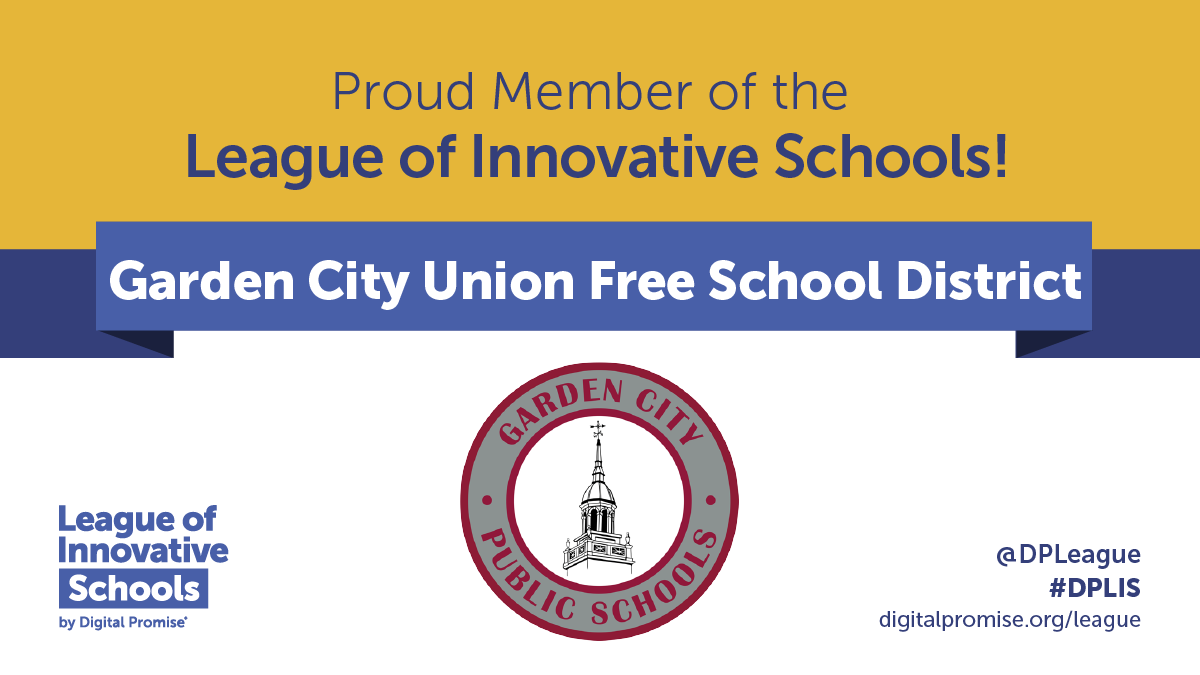 | |
Garden City Public Schools accepted into
National Network of Innovative School Districts
Garden City Public Schools has been accepted into the League of Innovative Schools (The League), a national network of school districts that connects and supports the most forward-thinking leaders in education. The League is organized by Digital Promise, a global nonprofit working to expand opportunity for every learner by bridging solutions across research, practice and technology.
Garden City was selected from a competitive national pool of applicants based on its educational leadership, demonstrated commitment to equity and excellence, innovative vision for learning, key achievements and collaborative spirit.
“We are honored to be a part of the League of Innovative Schools,” said Superintendent of Schools Dr. Kusum Sinha. “We have prioritized integrating technology in innovative and purposeful ways into our curriculum. We look forward to showcasing this work through our involvement in the league and learning from other school districts across the nation, as well.”
The League officially welcomed Garden City Public Schools and other new members at its fall convening from Sept. 30-Oct. 2, 2024, held in-person in Lindsay, California.
| |
 | |
Cold Spring Harbor School District celebrates Remembrance Bowl Game Day Tribute and Homecoming Celebration
Following a weeklong series of educational programming to commemorate the 81st anniversary of the Allied Invasion of Normandy, the Cold Spring Harbor Central School District hosted the second annual Remembrance Bowl on Sept. 27.
The week included a series of lessons on World War II, patriotism, service to your, school, community and country and the historical events surrounding the Allied Invasion of Normandy. In addition to curricula taught across grades K-12, high school, middle school and elementary students attended assemblies where they heard directly from visiting French dignitaries including Helen Patton, granddaughter of WWII General George Patton.
The evening before the event, both the Cold Spring Harbor Seahawks and the Island Trees Bulldogs listened and learned from Helen Patton and Michelle Strauss during a jersey signing event.
Each team member also received this prayer card to remind them of the “Champagne Bowl,” a football game between the 82nd and 101st Airborne Divisions during WWII which never took place due to the Battle of the Bulge breaking out on the scheduled date of the game.
| |
|
Congratulations to Copiague and Garden City
Marching Band Champions!
| |
|
From the N-SSBA Archives
Executive Committee Meeting
November 16, 1995
| |
Are You Following Our Facebook Page? | | | | |